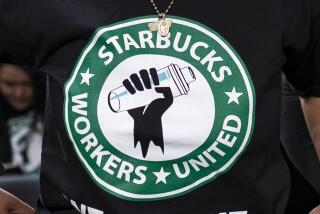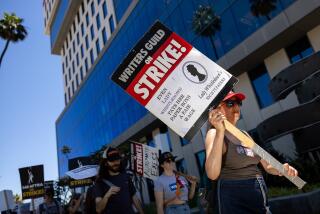Federal Anti-Racketeering Drive Scored as Ineffectual
- Share via
WASHINGTON — A draft report for the President’s Commission on Organized Crime criticizes the federal government’s drive against labor racketeering as “fragmented and ineffective” and cites ominous indications of increasing business cooperation with the mob, The Times learned Monday.
In a staff-written report circulating among the commission’s 19 members for their approval, the panel calls for an industry-by-industry attack to loosen the underworld’s grip, for firms to stop doing business with organized crime and for unions to move aggressively to cleanse themselves of mob influence.
Commission research director Nicholas L. Chiarkas, outlining the staff’s conclusions in an interview, said labor racketeering results in millions of Americans paying organized crime “a surcharge on a wide range of goods and services.”
He said the report cites estimates that fewer than 400 of the nation’s 70,000 local unions are dominated or influenced by organized crime families. But many of the mob-connected locals have thousands of members and operate in critical commercial sectors in large metropolitan centers, Chiarkas said.
By dominating key labor unions, organized crime controls construction, garbage carting, wholesale and retail meat processing, trucking and waterfront trade in some major metropolitan areas, Chiarkas said.
In those markets, organized crime “determines who will do business and who will not” by allocating territories, setting prices, dictating wages and benefits and making a sham of collective bargaining, Chiarkas said the report concludes.
Acknowledging that the federal government has stepped up its attack on labor racketeering in recent years, Chiarkas said the effort too often amounts to “body counts--how many labor racketeers can we identify and prosecute in a given union.”
He said the report concludes that a broader, more systematic approach is needed, “with the President working through the attorney general to develop a national strategy for removing organized crime from the marketplace.” It calls for forming “industry-specific” task forces under the attorney general, drawn from all government agencies with relevant expertise and run by U.S. attorneys, Chiarkas said.
Critical of Agencies
The report is highly critical of the lack of coordination and direction among the five federal agencies that enforce labor racketeering laws--the Justice and Labor departments, the Internal Revenue Service, the National Labor Relations Board and the Securities and Exchange Commission. Too often the agencies and units within the agencies “work at cross purposes or in open conflict,” Chiarkas said.
The report directs its sharpest criticism at the Labor Department, which it accused of “an inherent conflict of interest” because it has been an advocate of labor. The report proposes placing the department’s enforcement functions under an independent, presidentially appointed official within the department who would serve a specific term, the way the FBI director does.
Commission studies observe that organized crime’s ambitions extend to controlling both unions and businesses, and they illustrate many instances of allegedly corrupt managers cooperating willingly with organized crime and deriving benefits from the association, Chiarkas said. He declined to be more specific until the issuance of the report, currently scheduled for next month.
Chiarkas cited commission studies depicting the construction and meat processing industries in New York as examples of unions and businesses sometimes being “willing participants” in labor racketeering. These industries are particularly susceptible to labor racketeering, Chiarkas said, because they use cheap labor, and their employers are likely to bow to strike threats.
New York Example
He said the New York example is representative of problems in such major metropolitan areas as Cleveland, Chicago, Miami, Philadelphia and St. Louis.
The report includes a detailed examination of the four international unions most frequently tied to organized crime--the International Brotherhood of Teamsters, the Laborers International Union of North America, the Hotel Employees and Restaurant Employees Union and the International Longshoremen’s Assn.
Chiarkas, who is also the commission’s deputy chief counsel, said that while organized crime is gaining control of markets through unions, the plunder of union resources remains a goal.
The report compares salaries paid to officers of mob-linked unions with those given officers of legitimate unions. It notes that Teamsters Union President Jackie Presser is paid an annual salary of $755,874 by a variety of Teamster sources--10 times the salary of Owen Bieber, head of the United Auto Workers, and about six times the pay of Lane Kirkland, head of the AFL-CIO.
More to Read
Sign up for Essential California
The most important California stories and recommendations in your inbox every morning.
You may occasionally receive promotional content from the Los Angeles Times.













